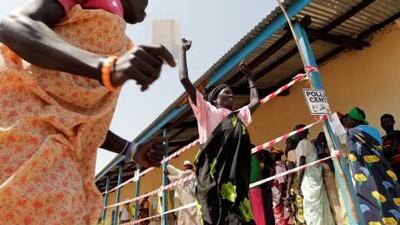JUBA// Voters turned out in droves for the second day at polling stations across the South Sudanese capital, which remains abuzz with arguably the most important event in the embattled history of Africa's largest country.
The week-long self-determination vote is widely expected to split the nation and put the seal on five decades of north-south conflict, in which about two million people were killed and another four million fled their homes.
The prospect of southern independence was not lost on any of the voters in Juba.
As former US president Jimmy Carter worked the crowds yesterday at a polling station under a tree in Juba, voters shouted their greetings to him, inevitably delivering the refrain: "We are going for separation."
That sentiment is nearly unanimous, and the joyous atmosphere permeating the process is a marked contrast to the suffering endured by this oil-rich but underdeveloped area, nestled in the volatile Horn of Africa.
"I am happy because I've been waiting for this since I was born," said Francis Andugu, 47, a carpenter. He would have come to vote on the first day of polling, he said, but his seven-year-old daughter was sick with malaria and he had to take her to a clinic.
Mr Andugu said he hopes for independence because he does not want the next generation to suffer.
"We want them to get a better education, a better life," he said, referring to his seven children, as he stood in a queue that wound around a school room.
On the other side of the building, a grinning Cecilia Tete, 35, said that, to her, the referendum means freedom for her and her fellow citizens. She too had wanted to vote on the first day but caring for her infirm mother-in-law at home kept her from queueing up. Today, she and her husband were in line when polls opened by 8am, and were still waiting after two hours.
The scale of the turnout on the first of the seven days of polling has already put the south well on the way to reaching the 60 per cent threshold set by a 2005 peace deal between the north and south for the referendum to be valid.
"The percentage of those who voted yesterday [Sunday] in the northern states was 14 and in the southern states it was 20 per cent," Paulino Wanawilla Unango, of the South Sudan Referendum Commission, told reporters yesterday in Khartoum. More than 3.7 million people registered to vote in the south are expected to cast their ballot, some at polling centres so remote that ballots had to be delivered by helicopter. Some will walk for hours to reach their centre, which, even in the southern capital, may be found under a tree, where a cardboard stand draped with bright yellow cloth allows voters to make their decision in secret.
Despite the sense of triumph and hope in the air, southern Sudanese such as 27-year old Gabriel Lago understand that development and democracy may not blossom in the new state overnight.
"It will not happen fast but, little by little, people will have more chances - chances of work, chances of education - more than before," he says.
Overshadowing the massive referendum turnout was a flare-up of violence in the disputed Abyei district on the north-south border, where the feuding Misseriya Arab and Ngok Dinka peoples both reported heavy losses over the past three days totalling at least 33 dead.
Tensions in the district have been rising with the launch of the vote in the south. Abyei had been due to hold a simultaneous plebiscite on its own future, which has been indefinitely postponed.
There was also deadly fighting in Unity state, a key oil-producing area near the north-south border where voting was suspended in some areas on Sunday after troops killed six militiamen over the previous two days, the southern army said.
Independence for South Sudan would also present a host of post-vote issues to be settled, all of them related to the future of relations between Sudan's north and south.
Yesterday, Mr Carter said Sudanese President Omar al Bashir is ready for the north to take on all of the country's US$38 billion (Dh135bn) debt, freeing the war-ravaged south of any liabilities if it votes for independence. "I spoke with President al Bashir. He said the entire debt should be assigned to north Sudan and not to the southern part," Mr Carter told CNN in an interview.
Provisional results for the southern states will be not be announced until January 30, but polling stations will begin declaring their returns from Saturday, Wanawilla said. Collating of the results takes so long because of the problems involved in collecting ballot boxes in a vast, war-ravaged region that has just 40km of tarmac road.
Mr al Bashir, an army man who led the north's war against the south for a decade and a half before signing the peace deal six years ago, has said he will respect the vote's outcome if it is "free and transparent".
* With additional reporting by Associated Press

